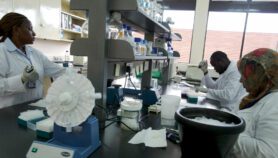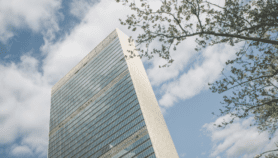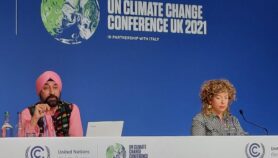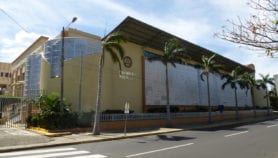By: Yojana Sharma
Send to a friend
The details you provide on this page will not be used to send unsolicited email, and will not be sold to a 3rd party. See privacy policy.
If elected director-general of UNESCO, Rachad Farah will put southern hemisphere science at the heart of its agenda, he tells SciDev.Net.
The race to be the next director-general of UNESCO (the UN Educational, Scientific and Cultural Organization) — to be elected in October — has already started. In November, Rachad Farah, a former Djiboutian diplomat in Japan and India, declared he would stand as a candidate to replace Bulgaria’s Irina Bokova, whose first four-year term of office comes to an end next year. Bokova launched her bid to be re-elected late last year.
SPEED READ
- UNESCO’s focus should be issues facing the South, says director-general candidate
- Setting up ‘blue helmets for education’ would be part of his plan for helping refugees
- He says that science can aid development and that UNESCO can ride out its financial crisis
Farah is Djibouti’s ambassador to UNESCO, and vice-chairman of the African Group on UNESCO’s executive board. His candidacy was endorsed by delegates at the African Union summit last month, and by the Organisation of Islamic States in November 2012.
Here, he tells SciDev.Net about his vision for UNESCO and his plans for tackling its reorganisation, including proposals for the sciences. He also outlines how he will deal with the agency’s crippling financial crisis, stemming from the United State’s decision to halt its contributions following UNESCO’s November 2011 vote to admit Palestine.
What kind of person makes a good UNESCO director-general — a diplomat, an academic, a scientist, a politician?
UNESCO has had many types of director-general. The first thing is to believe in UNESCO, whatever profession you are — whether diplomat, academic or other.
But I would also like to show that it is time for the South to take the driving seat and say: ‘This is also our organisation’.
Is it time for an African director-general of UNESCO?
I am an African and an Arab but I also represent other countries of the South.
UNESCO has contributed greatly to advancing peace in the world in the years since the Second World War. Its noble objectives such as culture, peace, education and science have created tolerance and reconciliation during this period. With the support of the intelligentsia, the scientific community and the universities, UNESCO has helped to build a culture of responsibility and a civil society in Europe, which gives its citizens a very strong hope for the future.
UNESCO’s main objective now is to tackle the challenges facing the South. For example, in the South we have problems of religious fundamentalism and terrorism. We need to rebuild strongly the theme of tolerance and peace, both in the minds and hearts of our nations.
UNESCO will be 70 years old in 2015. If we want the organisation to remain active for another 70 years, most of its objectives should be focused on the challenges facing the South. If southern nations are ready to take ownership of those objectives, and if we strengthen the UNESCO’s presence in the field — especially in the South — and its ability to hold dialogues on peace and civilisation, it will once again become a place of exchange, expertise and reflection between scientists, and experts, and political leaders; becoming a true laboratory of ideas.
These exchanges should not remain merely words, but must be translated into programmes in the field. It will be people in the South who will save UNESCO rather than the reverse, because without the South, UNESCO will disappear. I firmly believe this.
Having had seven director-generals from the North, and 25 years after the last African director-general — the Senegalese Amadou-Mahtar M’Bow — it is only fair that an African should be the next UNESCO director-general.
What would be your priorities as director-general?
The way to reduce the gap between the North and the South will be through science, because it’s through science that we can resolve many of the problems we are facing. Promoting science will also give a push to our students.
There needs to be more cooperation to enable the South to upgrade its universities and cooperate in research within Africa and with other countries, such as those in Asia. As a diplomat in India, I witnessed that many institutions in India are very willing to give support to Africa and to students from the South. And I am also going to raise this when I attend the summit between African and Latin American countries in Equatorial Guinea this week.
Soon, we will have meetings to discuss what happens to Education for All, the international programme to ensure full literacy by 2015, for which UNESCO is the lead UN agency.
UNESCO has to be very involved with these meetings and must be at the heart of an arrangement that will lead the South to cooperate in order to upgrade its universities. Science should be a priority in that cooperation.
We must strengthen existing universities, establish links between universities in the South and create true African centres of excellence as proposed with the Pan-African University that has been endorsed by the African Union in Addis Ababa this month. We must also establish strong partnerships, not just compete, with universities in the North.
We need to see what UNESCO can contribute on higher education so that after, say, ten years we might see Nobel prizes for science being awarded to people from the South. Why not? This will also be a very good indication that we have made civil society stronger in the South.
My other priority issue will be refugees.
In Africa we have more than 60 per cent of the world’s refugees. If you take the countries surrounding Mali, many refugees are going to Chad, Mauritania and Niger, and those refugees are the most vulnerable members of the population: women and children. There is no mechanism in UNESCO for helping to educate these people, who lack a strong voice. No one is talking about them. The UN High Commission for Refugees is giving them food, UNICEF (the UN Children’s Fund) sometimes gives them vaccinations and humanitarian supplies but there is no sustainable programme of education such as the UN Relief and Works Agency for Palestinian Refugees, which has been working with Palestinian refugees for 40 years.
I want to create the ‘blue helmets for education’. These will be dedicated education professionals that provide much-needed education to children in war-torn countries.
I believe it is UNESCO’s duty not only to provide support for institutions — schools and universities — but also to help those people without a voice and give them some hope. The important thing for UNESCO is not to build schools, although we can support this kind of programme. The most important thing is to create a programme of education for refugees.
Which scientific areas would you focus on building within the UNESCO structure?
UNESCO does not have enough money or resources to duplicate things. What the committee that reviewed science in UNESCO in 2007 has proposed is a very good road map, which I am going to continue with. The committee text, which includes a stronger focus on fewer scientific areas within UNESCO, is still up to date; the people on the committee were very competent.
Within other UNESCO committees — not only science, but all committees — we have to appoint experts, not based on where they are from, but based on their expertise. I want to bring scientists back to UNESCO. We need them.
The present director-general has proposed a merger of sciences with social sciences, an idea that is causing some opposition. Would you continue with this idea?
I will not agree to this.
Social science is one of the fundamentals of the UNESCO charter. It is a very important way to promote a culture of peace and tolerance in order to combat terrorism and religious fundamentalism. How can we ask UNESCO to remove these programmes?
In times of financial crisis, you don’t have to change anything or add anything. Taking something out is not opportune. You have to fix and stabilise what you have.
Would you continue regionalising UNESCO even if there is very little money for it?
UNESCO has to become closer to the reality on the ground, closer to those with no voice and to the marginalised. We have to set out the priorities for UNESCO at the very beginning, and the priorities, in my view, have to be in the field.
I believe the top level of UNESCO is the director in the field in any country. If they propose something after having reviewed and studied the situation, those responsible in UNESCO should give the green light and fund it.
My experience working as a diplomat for 15 years in Japan has taught me that, when initiatives come from the people close to the ground, you can be sure that the project will be realised because the people who proposed it are proud that it was accepted and they will be 100 per cent ready to carry out the project.
UNESCO is facing a financial crisis because of the withdrawal of US funds over the admittance of Palestine to its membership. Can you resolve this financial problem and raise the funds that are needed?
UNESCO is not a financial institution. If this withdrawal of funds by the United States had happened to the Islamic Bank, the World Bank or the IMF, it would be a catastrophe because these are financial organisations. UNESCO is not. It is promoting projects in education, culture and science. If we have projects within UNESCO, and if we are capable of bringing projects to the donors and to the banks such as the Islamic Bank and the World Bank, then I’m sure we can get the money to finance them.
The director-general and the member states must sit down and discuss what will be the next step and request the United States to restore its contribution. It has to be an appeal from member states to the United States: Washington has to understand that the member states are eager to keep the United States on board. I believe that equipped with the vision of the Obama administration, the United States will go along with what we are requesting.
Q&As are edited for length and clarity.













